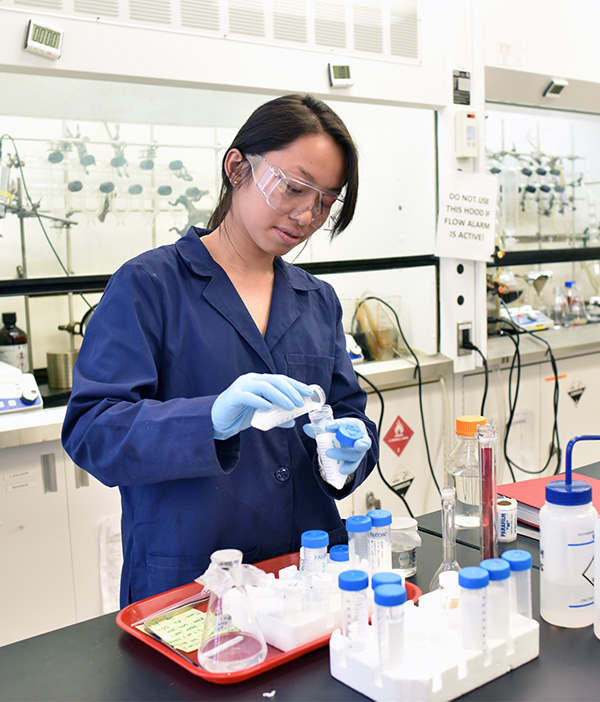Master of Science in Chemical Engineering

The graduate programs from Drexel Engineering prepare professionals for applying deepened skillsets and knowledge that will further their career in research or industry. Graduates are prepared to take on the advanced needs and requirements that chemical engineers use to address many of civilization’s biggest challenges.
Students gain knowledge of the science and the emerging fields in chemical engineering applications and processes, with an emphasis on engineering design and scientific analysis. You will become empowered to solve complex issues encountered in manufacturing, biotechnology, energy and the environment, polymer science and other fields. Learn about the advances in industry, gain a global viewpoint, build entrepreneurial and teambuilding skills needed to advance your career or graduate prepared for entry into a PhD program.
Delivery
- On-campus
- Full-time or part-time
- The 45-credit program will take approximately two years to complete on a full-time basis or can be completed on a part time basis in 3-4 years.
Areas of Specialization
The MS in Chemical Engineering allows for a flexible plan of study. Using technical and free electives, your coursework may cover a broad range of technical knowledge or focus on a subject matter to target an area of interest. Areas where course offerings are available include:
-
Biological engineering
Analyze biological systems to identify a need and apply engineering principles to improve or solve problems with interactions with those systems.
-
Computational engineering
Solve chemical engineering challenges through the use of computational analysis and modeling.
-
Energy
Investigates chemical engineering for uses in energy storage or renewable energy.
-
Engineering management
Incorporate business and leadership expertise applicable to leading projects and companies for success. It is possible to obtain an engineering management professional certificate with this specialization.
-
Environment and sustainability
Consider the application of chemical engineering for uses that improve environmental technologies and processes.
-
Polymers
Investigate the various uses of polymers for uses in diverse applications, from emerging areas to pharmaceutical and environmental.
Curriculum and Requirements
- The master’s degree requires a total of 45 credits; 15 credits of core chemical engineering; 24 credits of technical electives; and 6 free electives.
- Study track options include taking coursework only, research option, or a full MS thesis.
- Graduate Certificate in Engineering Management — earn an additional credential without adding credits to your plan of study. Using electives, you will gain skills to lead projects and teams. Learn more
The Master's in Chemical Engineering program offers an option for students whose undergraduate degree outside of chemical engineering. Students that come from related backgrounds can complete a set of core undergraduate chemical engineering courses in preparation for graduate-level study and still complete in two years.
Visit the Drexel Catalog for more information and sample study plans for areas of specialization or learn more about our admissions requirements.
Graduate Co-op
This program is eligible for Graduate Co-op — a unique, optional three or six-month work full-time professional experience that alternates with study, available for domestic and international full-time master’s students.
About Drexel Engineering

The Department of Chemical and Biological Engineering (CBE) offers an interdisciplinary perspective in order to develop a well-rounded engineer. Drexel students are encouraged to be innovative and imaginative in identifying a problem and analyzing potential approaches in the quest for a solution. The focus of the Drexel chemical engineering graduate program is to equip you with the tools for finding sustainable and achievable outcomes to address society’s biggest challenges, while making them relevant to your career goals.
The CBE Department is a collaborative and supportive community with opportunities for informal connections in and outside of the classroom, including enthusiastic faculty involvement of students in their research. The very active CBE graduate student association offers social and professional opportunities.
Faculty
Drexel places a high value on industry connections and experience at every level. Teaching faculty in this program are experts with industry experience or are at the forefront of research and teaching.
Philadelphia
The city of Philadelphia is our campus – a diverse urban environment with a variety of social, cultural and learning opportunities that will enrich your educational experience. Philadelphia is also a draw for talented instructors and researchers, meaning you will engage with some of the best minds in engineering and other disciplines. Learn more.
Research
All students in the master’s in chemical engineering program are welcome to engage in research as part of their degree or as extra-curricular activity. Full-time master’s degree candidates are encouraged to base their master’s thesis on an aspect of faculty research.
The CBE department research competencies support research themes of energy, sustainability and health and medicine and subjects directly linked to solving present-day societal challenges.
Visit research and design for more about other research activity at the College of Engineering.
Career Opportunities in Chemical Engineering
Chemical engineering graduate programs prepare you for a career that could include continuing your education in a PhD program or pursuing advanced technical, research or management positions in industries such as chemical, pharmaceutical or materials.
The outlook for chemical engineering jobs is good, with demand for employment expected to grow over 3% through 2034, at pace with the overall employment projections for all occupations according to the Bureau of Labor Statistics. Some studies report that chemical and materials scientists with master’s degrees have median salaries that are up to 18 percent higher than those with only a bachelor’s degree. The National Association of Colleges and Employers further shares that chemical engineers are projected to be among the top starting salaries of engineering disciplines.
Apply Now Graduate Admissions Department Page